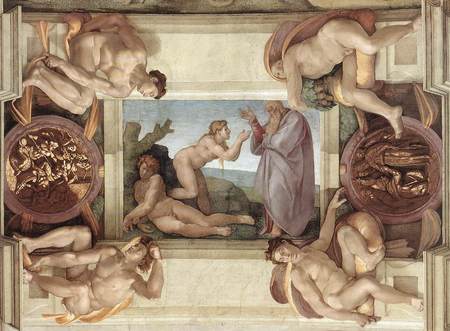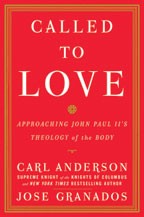 Sexuality is a beautiful part of being human and it is a gift from God that needs to be known, understood, appreciated and embraced (no pun intended). Sexuality is a holy part of being a man or a woman. Unfortunately, that’s not the message we receive in secular society and it is infrequently heard from the pulpit in Catholic churches and very likely not in other Christian communities. Unheard of from the pulpit, that is, until Pope John Paul II introduced his monumental work, Theology of the Body. But that’s a topic for another time. Sexuality is not just a religious issue, it is a human issue and everything human is of our interest.
Sexuality is a beautiful part of being human and it is a gift from God that needs to be known, understood, appreciated and embraced (no pun intended). Sexuality is a holy part of being a man or a woman. Unfortunately, that’s not the message we receive in secular society and it is infrequently heard from the pulpit in Catholic churches and very likely not in other Christian communities. Unheard of from the pulpit, that is, until Pope John Paul II introduced his monumental work, Theology of the Body. But that’s a topic for another time. Sexuality is not just a religious issue, it is a human issue and everything human is of our interest.
Tag: theology of the body
NFP (Natural Family Planning): formation for a fertile life
Saint Joseph Seminary – Dunwoodie was the setting today for a clergy seminar on Natural Family Planning (NFP) sponsored by the Archdiocese of New York Family & Respect Life Offices, The Couple to Couple League International and with the generosity of others as well. Some 40 clergy types (priests, deacons and seminarians) attended. It was a blessing to have Dr Theresa Notare, Dr Kyle Beiter, Richard & Vicki Braun, Dr. Jack Burnham, Fr John Higgins, Andrew & Tracey Pappalrdo, and Erik & Anne Tozzi as presenters.
Continue reading NFP (Natural Family Planning): formation for a fertile life
Called to Love: Approaching John Paul II’s Theology of the Body
This new book, Called to Love: Approaching John Paul II’s Theology of the Body, due to be released on April 14, discusses John Paul II’s theology of the body and the meaning of human love. This interview appeared in the April 2009 issue of Columbia magazine, the organ of communication of the Knights of Columbus. I am grateful for the opportunity to re-publish it here.
By the Columbia Staff
From 1979 to 1984, Pope John Paul II delivered 129 Wednesday audiences in which he presented a vision of the human person, created as a unity of body and soul, and the vocation of every person to love. The pope’s catechesis, which has become known as the “theology of the body,” is considered by many to be revolutionary, as it develops profound truths about man’s most basic experiences — who we are and who we were created to be.
 A new book about the theology of the body, which is being published this month, was co-authored by Supreme Knight Carl A. Anderson and Father José Granados, assistant professor at the Pontifical John Paul II Institute for Studies on Marriage and Family at The Catholic University of America in Washington, D.C. Titled Called to Love: Approaching John Paul II’s Theology of the Body (Doubleday), the book sheds light on the significance and implications of the pope’s insights.
A new book about the theology of the body, which is being published this month, was co-authored by Supreme Knight Carl A. Anderson and Father José Granados, assistant professor at the Pontifical John Paul II Institute for Studies on Marriage and Family at The Catholic University of America in Washington, D.C. Titled Called to Love: Approaching John Paul II’s Theology of the Body (Doubleday), the book sheds light on the significance and implications of the pope’s insights.
Father Granados: Theology does not only deal with our questions about God; it deals mainly with God’s word to us — that is, the way he talks with us and tells us about himself and his love for us. For theology, the Incarnation is central, this event in which God himself comes to meet us and becomes visible by assuming a human body. Because of the Incarnation, the body enters into the realm of theology. When the Word became flesh, God made clear to us that the body has a language able to talk about God and about the way he calls us to love him and each other.
Central to John Paul II’s insights is the concept of the communion of persons, which he sees as a reflection of the Trinity. In what way does the pope develop the traditional doctrine?
Father Granados: The good news of Christianity is that God is love, a communion of persons in which the Father gives himself totally to the Son in the union of the Holy Spirit. John Paul II has developed an understanding of the human person in the light of this Trinitarian love. Human love, and particularly the love of the family — between husband and wife, parent and child, brothers and sisters — is the mirror in which God’s love shines in the world, and man is able to share in it. John Paul II has taken this central theme of the tradition and has interpreted, in this light, the whole of man’s vocation and destiny.
What might people gain from studying the theology of the body? What inspired you to write this book?
Father Granados: The aim of this book is to help the reader discover the great vocation to which God calls him: a vocation to love. We often live unaware of this great call to love and thus are unable to give an answer to it. Because of this, our lives risk being wasted, without attaining their fulfillment. Through this book, we would like to reawaken the reader to the great news of his existence, to the wonder of God’s original plan for him. This means that the theology of the body is not only a teaching about human sexuality, but it also contains a whole understanding of the human person and of the world. In fact, John Paul II’s aim is to give an account of the whole of reality in terms of love.
Even before becoming Pope John Paul II, Karol Wojtyla had decades of pastoral experience and wrote on matters related to marriage and family. Why is the family so important, and what does the theology of the body teach us about the nature of human love?
Father Granados: According to John Paul II, the family is the place where we discover who we are. The pope speaks in this regard of the genealogy of the person. Our identity as human persons is formed in the family. The fact that we are children of our parents, for example, is not something accidental, but constitutes a central part of our being. The same is true for a parent; it is not just that a person has a child, but that he is a father or mother. In the family, we understand that we come from another as children and are called to become spouses and parents. In other words, one’s life is defined by an original love that is first received, as a child, and then given to another in order to be fruitful.
Beginning with man’s “original experiences” in the first chapters of Genesis, the catechesis on the theology of the body is, in a way, a Scriptural commentary about human nature. What role does Christian revelation play in understanding who we are? Can we explain John Paul II’s insights in secular terms?
Father Granados: Modern man suffers from a crisis of identity. We need to know who we are and what our path in life is. In the book of Genesis, John Paul II saw the genetic code of our identity as human beings. For instance, the pope talks about an original solitude: Adam realizes in the garden that he is alone. This experience is interpreted in the light of man’s relationship with the Creator, the only one who fulfills our expectations and desires. This means that our identity is always constituted before the mystery of God, as creatures who come from him.
John Paul II then adds the experience of unity: We only know who we are and how to reach God when we encounter another person through love. Precisely because the pope starts with an analysis of human experience, the theology of the body is universal and refers not just to Christians. Every human being asks himself about the meaning of life and how to find fulfillment. The theology of the body answers these questions in terms of love.
The book is being released one year after Pope Benedict XVI’s visit to the
Father Granados: At the beginning of his pontificate, Benedict said that he did not want to write much, because he conceived his mission as making John Paul II’s great work better known. In fact, Benedict’s first encyclical, Deus Caritas Est (God is Love) was a continuation of John Paul II’s work on love. Like his predecessor, Benedict takes as his point of departure the way Christ reveals to man his own vocation. In Deus Caritas Est, he writes that in order to give a good definition of love, we will need to start by looking at the Crucified one (12). It is at the foot of the Cross that we learn what love is all about.